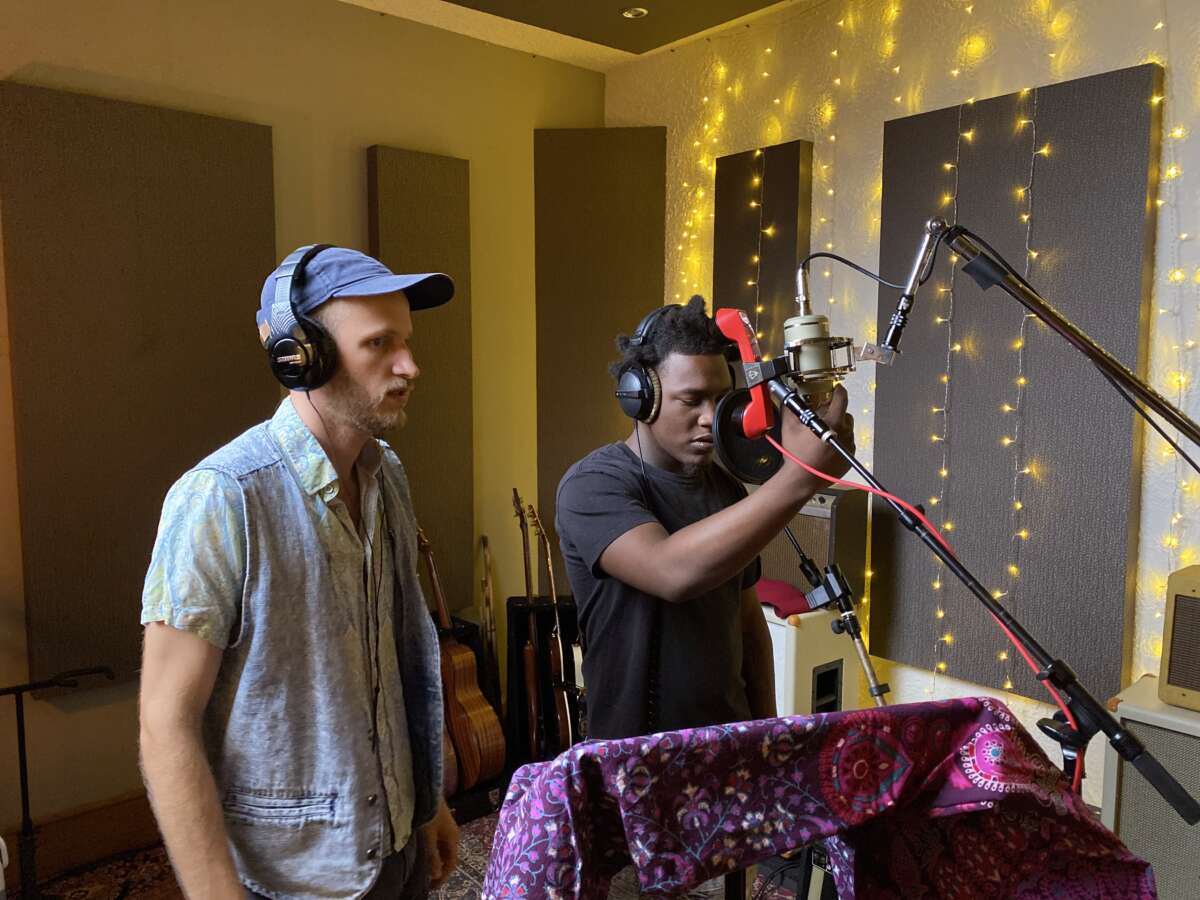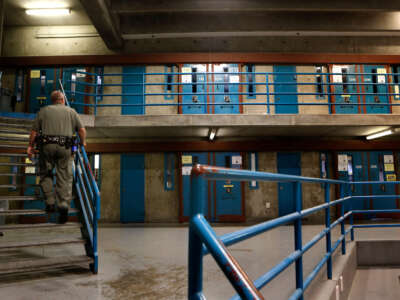Part of the Series
The Road to Abolition
“I don’t fuck with none of y’all cops,” rapped Julius Smith, aka Prince Jooveh, on the song “Hands Up.” “Eighty percent of y’all are cowards, y’all stay up in our business.” In one hand, he held a phone to hear the trap beat. In the other, he held a second phone to fire off lyrics. He had 30 minutes to get it right before time ran out — he was recording behind bars as a person incarcerated by the Florida Department of Corrections for 17 years. Jooveh had to finish before the guards told him time was up.
The last line of his song was an echoing wail, “We are not free. The only thing we are guilty of is pain and poverty. The poor get prison. The rich get richer.”
In prisons across the United States, music beats against walls and bars. Many incarcerated people facing long sentences feel a welling-up in their throats: stories that need to be told.
In June 2025, the new album Bending the Bars — produced by the prison abolitionist group Community Hotline for Incarcerated People (CHIP) — will be released. Singles are already online from its 16 tracks. Some tell of love lost. Some lament youthful mistakes. Some expose the racism of the prison-industrial complex.
Now more than ever, art by people in prison is needed. Making music transforms how incarcerated people see themselves. Hearing their music also transforms how the public sees them. The image of incarcerated people is being used by the Trump administration to make the case for deportations. Trump hammers relentlessly on the scary headlines of “terrorists” and “violent criminals” to normalize breaking the rule of law and dismantling civil rights. The goal is not to deport people who break the law, but to lay the groundwork for assaulting citizens who protest his plans to create an authoritarian police state.
Making Music in the Hole
“Honestly at first it was annoying,” said Gary Field, who has been incarcerated for over 20 years by the Florida Department of Corrections and who is a board member of CHIP, in an interview with Truthout. “When I got to prison, I’d hear the men battle rapping. They’d use whatever they had. Bang cups on the bars. Beat their chests. I listened and realized that they were incredibly talented. So many of them could easily have number one hits on the radio.”
Bending the Bars rips away bipartisan perceptions and propaganda on crime and punishment by letting the artists speak their truth. The rappers tell us about their lives and hopes, grudges and fears. They mourn lives they’ll never live. The image that rises from their lyrics is of complex human beings who can be a part of society again — which is in stark contrast to the imagery of the “unredeemable, violent criminal” that has been dominant since the 1970s: This toxic caricature of incarcerated people began with President Richard Nixon’s 1971 “war on drugs” and President Ronald Reagan’s “get-tough-on-crime” turn, when many U.S. prisons shed their rehabilitation programs. The shift left the nearly 2 million people who are locked up with little to no resources to make a life after serving their sentences.
Beyond the 2 million behind bars are 4 to 5 million on parole. According to prison therapists, 15 to 20 percent of incarcerated people have mental illnesses. Even after jail, many people with felony convictions can’t vote, and the stigma of having had a felony conviction previously is like an invisible ball and chain, stopping them from getting jobs, housing and education. Cast out of society, they are driven back into the streets. It’s no wonder that many return to prison. It’s no wonder that the U.S. has made a revolving-door prison-industrial complex.
This system is why abolitionist organizations like CHIP figuratively break down prison walls by fighting draconian rules that further isolate jailed people. In Broward County, Florida, near where CHIP is based, Gov. Ron DeSantis ended free monthly calls for incarcerated people and reduced their authorized mail to postcards. No letters. Just postcards.
Getting the voices of jailed people out matters. It matters to those inside: As Field tells Truthout, “The project brought people together. We would coordinate with CHIP to get outside collaborators. We had no high-tech audio equipment. We had to use phones to record. We got people in rival gangs to work with us. I’m a people-person. I was the house man, and I’d talk to everyone.” Field cites his own life story to challenge prison stereotypes. “When I was young, I got a scholarship to a prep school in Connecticut, met the children of bankers and senators. I traveled to Europe, and I ended up in prison at 46. I’m an odd bird.”
He talked about his life and the dramatic twists and turns it took. As he painted the scenes, the prison phone system told us in a robotic voice that he had one minute left. Field raced against the clock to share his reality but time ran out.

Beating the Rap
“I’m so tired of these four walls,” raps “Ghostman” on the song “Four Walls.” “I’m so tired of these phone calls.” A major theme in Bending the Bars is showing the humanity of prisoners stereotyped by right-wing media. The tactic of flipping the script is one of the oldest, deepest and strongest traditions in Black art, whether literature, painting or music.
Hip Hop flips the script on racism. Rappers have always pointed out that criminals are often the victims of systemic racism and poverty. You can hear this in songs from rap’s golden era — say in 1982’s “The Message” by Grandmaster Flash, who raps about a broken city that breaks its people. You can hear it in KRS-One’s 1993 hit, “Sound of the Police” where he booms his bass voice going, “Whoop! Whoop!” like a cop car swooping in. You can see it the famous scene in the 1998 film Slam where spoken word artist-activist Saul Williams rips a poem from his heart in a prison yard as fellow prisoners are stunned by its beauty.
Black art displaying Black humanity goes back to the beginning: Frederick Douglass’s 1845 autobiography, Narrative of the Life of Frederick Douglass, has one of the most powerful scenes of Black art. He wrote of hearing other enslaved people sing in the woods between plantations, “They told a tale of woe which was then altogether beyond my feeble comprehension; they were tones loud, long, and deep; they breathed the prayer and complaint of souls boiling over with the bitterest anguish. Every tone was a testimony against slavery, and a prayer to God for deliverance from chains.”
Here is the truth: Art rescues us from oppression. Bending the Bars is one thread in a long quilt, woven by voices over the centuries, and one sorely needed now. The Trump administration constantly invokes images of “animalistic criminals” to justify deportation. White House Press Secretary Karoline Leavitt put it this way, “So the president has discussed this idea publicly. … American citizens to be deported, these would be heinous violent criminals who have broken our nation’s laws repeatedly.”
Trump has long used racist stereotypes and fearmongering about incarcerated people to push a right-wing authoritarian takeover. Now he is extending that fearmongering to dissidents and political enemies — and next, could be you. This is why we need to see artists like Prince Jooveh, who says he rediscovered himself in music. “I got to see myself as an artist,” he said in an interview after he was released in February. “I got a job. I’m looking for a recording studio.” He was breathless on the phone. “I saw the effect my song had on people. It was electrifying.”
Help Truthout resist the new McCarthyism
The Trump administration is cracking down on political dissent. Under pressure from an array of McCarthy-style tactics, academics, activists and nonprofits face significant threats for speaking out or organizing in resistance.
Truthout is appealing for your support to weather this storm of censorship. We fell short of our goals in our recent fundraiser, and we must ask for your help. Will you make a one-time or monthly donation?
As independent media with no corporate backing or billionaire ownership, Truthout is uniquely able to push back against the right-wing narrative and expose the shocking extent of political repression under the new McCarthyism. We’re committed to doing this work, but we’re also deeply vulnerable to Trump’s attacks.
Your support will help us continue our nonprofit movement journalism in the face of right-wing authoritarianism. Please make a tax-deductible donation today.
Read full article at source
Stay informed about this story by subscribing to our regular Newsletter


